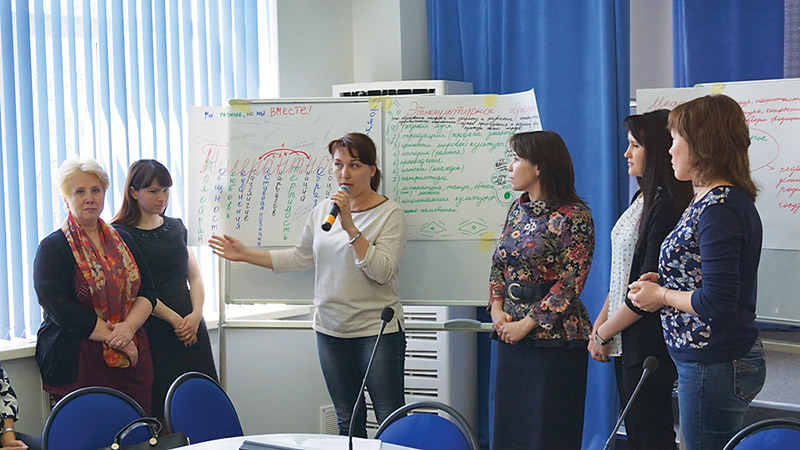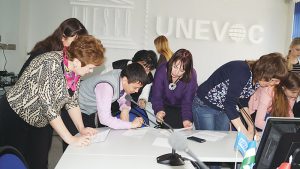
Scientific seminar for deputy directors on educational work, teachers, social workers, psychologists, counselors and senior teachers colleges, was organized by our institute on April 25, 2016.
The theme was the most relevant for today — “The role of educational institutions in shaping the multicultural environment of modern Russia”. Its importance is not in doubt, because the child can not affect the formation of healthy or unhealthy the country’s future.
Tanzilya Nigmatullina, director of the BIST and Elena Haffazova, Head of the Education Department of the Administration of Ufa gave a welcome speech to the participants. Then Tanzilya Nigmatullina spoke on “Technology of formation of youth citizenship in multiethnic environment”. She noted that, according to the Law “On Education in the Russian Federation”, one of the principles of state policy in the field of education is a civic education in the spirit of respect for human rights and freedoms, love for the Homeland, the family, she stopped on the concepts of “patriotism” and “citizenship”: stressing that they have differences, although many researchers identify them.
The main task of educational institutions is to raise a citizen. The family also is very important in this process. Exactly there the “adult forms of social activity and responsibility” lays. Tanzilya Nigmatullina showed sociological survey of parents and students in 9–11 grades of schools of Ufa, provided within the framework of sociological laboratory of our institute, which aroused great interest among the participants, and then moved to the analysis of technologies of formation of civilization among children and young people.
Next was a work shop of Galina Denisova, Professor of the Institute of History and International Relations “Southern Federal University”, Doctor of Social Sciences, “Ethno-cultural education as a mechanism of tolerance”/ Galina Denisova showed the legal basis of the formation of a multicultural environment at an educational institution, the main directions of ethno-cultural content of education in the school, its meaning, and identified possible “points of tension”: civic identity — ethnic and cultural identity; ethno-cultural education — multicultural education; citizenship — patriotism; legal possibilities of ethno-cultural education — subjective factors of its implementation.
 After lunch, the participants were divided into two groups: the first group went to the training “Conciliation technology in the work of the teacher (school mediation) as a way of realization of the students’ rights”, it conducted Maxim Belyaev, the head of the Agency’s reconciliatory technologies UNESCO-UNEVOC Centre in the Russian Federation on the basis of the Bashkir Institute social technologies.
After lunch, the participants were divided into two groups: the first group went to the training “Conciliation technology in the work of the teacher (school mediation) as a way of realization of the students’ rights”, it conducted Maxim Belyaev, the head of the Agency’s reconciliatory technologies UNESCO-UNEVOC Centre in the Russian Federation on the basis of the Bashkir Institute social technologies.
The second group had chosen the training “Civil rights of the person as the basis of the right cultural diversity”, which has been leading by Elena Shurygina, Associate Professor of Social Communication and Technology department «Southern Federal University», PhD in Sociology.
As аll participantsy noted, it was informative and has exceeded all expectations. Their regard was to make such seminars
regularly.

 April 26th, 2016
April 26th, 2016  ALINA B.
ALINA B.  Posted in
Posted in